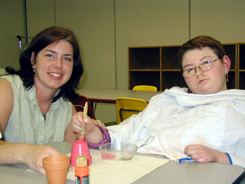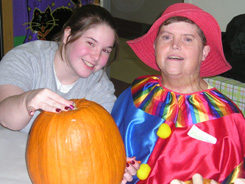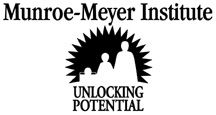The C. Louis Meyer Foundation and the UNMC Munroe-Meyer Institute will hold its first “Walk & Roll for Disabilities” on Sunday, Jan. 30 to raise money for recreational and respite services for adults with developmental disabilities.
|
|
Eric Crouch, 2001 Heisman Trophy winner and former Nebraska Cornhusker quarterback, will be honorary captain for the event.
The Louis Meyer Foundation, a not-for-profit organization, is the only source of funding for adult recreational therapy, adult respite care and habilitation programs at UNMC’s Munroe-Meyer Institute.
 |
Eric Crouch |
Organizers hope to raise $100,000 with the event.
“We have adequate funds for children with developmental disabilities, but not for adults with developmental disabilities,” Dr. Crawford said. “Once children turn 21-years-old, funding and opportunities for recreation and respite care diminish.”
He said one-third of the families served lives at or below the poverty line and is typically a single parent. “There’s a lot of burnout with families and caregivers of adults with special needs,” he said. “This gives our families and caregivers planned breaks and things to look forward to — maybe getting the kitchen painted or even something simple like returning gifts.”
 Part of keeping special needs adults engaged in the community means offering them recreational activities, Dr. Crawford said. “We’re one of the few recreational programs in the area that offers adaptive recreational services with a trained staff and hundreds of volunteers,” he said.
Part of keeping special needs adults engaged in the community means offering them recreational activities, Dr. Crawford said. “We’re one of the few recreational programs in the area that offers adaptive recreational services with a trained staff and hundreds of volunteers,” he said.
Developmental disabilities are a diverse group of severe chronic conditions that are due to mental and/or physical impairments. People with developmental disabilities have problems with major life activities such as language, mobility, learning, self-help, and independent living.
They occur anytime during development up to 22 years of age and usually last a lifetime. There are more than 200 causes, including genetic conditions, and by trauma sustained at birth or during an accident. It is estimated up to 2.5 percent of the population has some form of developmental disabilities, Dr. Crawford said.
 The Munroe-Meyer Institute recently formed a family advisory committee that will be involved in creating and helping fundraise for recreational and respite programs.
The Munroe-Meyer Institute recently formed a family advisory committee that will be involved in creating and helping fundraise for recreational and respite programs.
“We’re asking our families with adults and children with developmental disabilities for their help in building this program that will benefit them now and in the future,” Dr. Crawford said. “Our parents will continue to need these services when their children become adults. We have a sense of urgency. We need to build these programs today so the services don’t go away.”
The funding of recreational programs for children and adults with developmental disabilities and their families and caregivers are entirely dependent on private donations. For more than 23 years, programs have assisted children, teens and adults with special needs.
“Despite this record, one of the realities is what little money we have for adult services. Year after year, we see relationships we have formed throughout the years fade away as children turn 21,” Dr. Crawford said. “Services for adults is limited. We need to develop the capacity to maintain quality recreational services for those we serve and their families throughout their life span.”
 Judy Quest and her family have been beneficiaries of the services for 20 years. As the parent of 23-year-old Melanie, who has cerebral palsy, Quest knows the value of these programs.
Judy Quest and her family have been beneficiaries of the services for 20 years. As the parent of 23-year-old Melanie, who has cerebral palsy, Quest knows the value of these programs.
Quest said one day a week, the service provides a safe, fun place that allows families to have free time to do things with their other children or run errands. Melanie attends a recreational program at the UNMC Munroe-Meyer Institute every Thursday.
“This is where they see their friends,” Quest said. “This is the most normal part of a week for a person with severe disabilities. Even my daughter with all the support from her family is really left behind. Some of our children have nothing to look forward to. Their lives are so flat sometimes.
“Many of those I’m talking about are very bright people but they’re trapped in their bodies. These programs provide stimulus and fun. I cannot speak more positively about the people who work there and the program that they put on.the self-worth that they inspire in their participants is unreal,” Quest said.
Sponsors of the Walk & Roll for Disabilities event include: Panera Bread, Crouch/Churchich Recreation, River City Recycling, Westroads Shopping Center, and Printmakers.